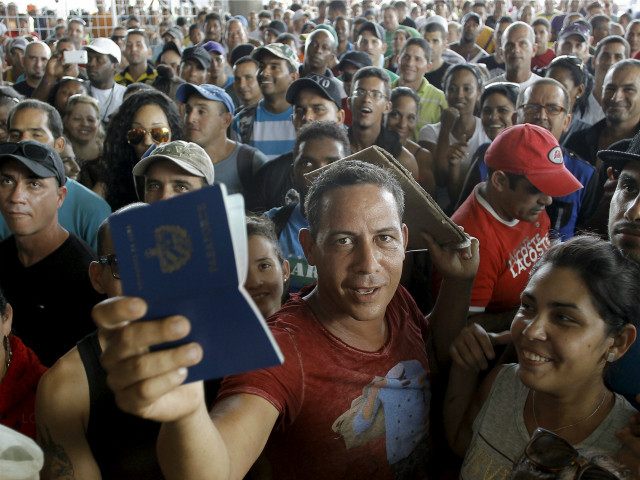Thousands of Cuban nationals who managed to escape the island and reach Central America are now stranded in Costa Rica and Panama, blocked by the leftist government in Nicaragua from moving north towards America but unable to stay where they are.
In Panama, a group of 700 Cuban refugees prevented from moving north have issued a statement declaring themselves on hunger strike until they are allowed to pass. “We criticize Costa Rica because they complained that Nicaragua had closed the borders when there were Cubans there who couldn’t pass, but now they are doing the same,” the group’s spokeswoman Yailin Álvarez said in a statement. Costa Rica allowed the free transit of thousands of Cubans in November to reach the United States, but closed its borders immediately following the release of the initial wave of refugees.
The Cubans neither want to remain in Panama nor have a legal avenue with which they could apply for legal residency there. The United States provides Cubans who reach American land full refugee status as a recognition of the oppression they suffer under the Castro dictatorship.
In addition to the hunger strike group, 1,300 mostly-Cuban migrants crossed into Costa Rica on Wednesday in a manner that the Costa Rican government described as “violent and forced.” Calling it “an affront to the people of Costa Rica,” the office of the nation’s presidency asserted that “the government’s position is firm in not accepting one more migrant.” Reports indicate with some alarm that not all the migrants are Cuban refugees, and some are from Africa and Asia. Their status upon arriving in the United States would be that of illegal immigrant, and Central American governments say they have little information on their origins.
The estimates of the number of Cubans in Panama vary from 800 to 3,000. On Thursday, these Cubans staged a protest on the Costa Rican border, blocking traffic and asking to be allowed to pass. The group alleged that Costa Rican authorities used tear gas to make them move as they sat in the middle of the road.
“We are here to represent the nearly 3,000 of us who are stranded in Panama to ask as a favor – not demand – that they let us through, that our objective is not to stay in Panama or Costa Rica, but to reach the United States where we have all the rights we need to live and be human beings,” one of the protesters told a local paper. “We are a humble people… sacrificing a lot in our lives for this voyage.”
Panamanian and Costa Rican authorities are turning their ire onto the United States, suggesting it is immoral to recognize the suffering of Cuban refugees under communism. “This is not a problem we caused, it is in the place of origin and destination. We are just a transit state,” Panamanian minister of security Rodolfo Aguilera said on Thursday. Costa Rican Foreign Minister Manuel Gonzalez, meanwhile, called the recognition of Cuban refugee status in the United States “a perverse incentive towards migration that favors human trafficking.”
Refugees are asking the governments of Central America not to cave to pressure from Havana. “Stop playing the Castro’s game, stop playing the game of dictators,” one refugee tells the cameras in the above video, “We don’t want anything, we’ll walk the whole way.”
The man focuses his outrage on Nicaragua, a nation with a leftist, pro-Castro government. ” How many people died in Nicaragua? My uncle died in Nicaragua defending the people of Nicaragua. For them to do this to us…” he laments.
Fidel Castro forced thousands of Cuban troops to fight alongside Marxist Sandinista guerrillas in Nicaragua in the 1980s, and Nicaragua remains a Cuban ally to this day. In November, the Nicaraguan military attacked a group of Cuban men, women, and children trying to cross the border north. They used tear gas and water cannons, leaving many injured. Cuban refugees are still not allowed to enter the country from the south.

COMMENTS
Please let us know if you're having issues with commenting.